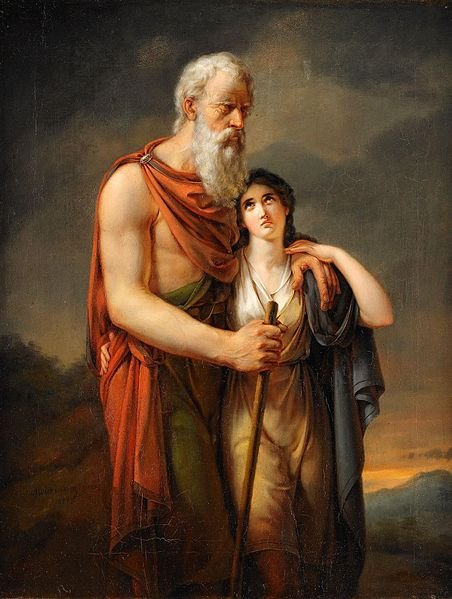 The Antigone has been one of the most enduring as well as popular of Greek tragedies. Though the series of events on which the plot is founded — the determination of Antigone to submit her life rather than neglect her customary duties — appeals less forcibly to contemporary than to ancient sentiment, yet the general thrust of the play, the conflict between human law and the ethic of the individual, is one of universal and profound importance. Various interpretations of the moral purpose of the play have been offered by critics. Should Antigone, it is asked, be regarded as an innocent victim of her social situation or temporal circumstances? Or is the balance of guilt and adversity not equitable, and are Creon and Antigone both deserving of their fate, the one for his disrespect for the divine laws, the other for her bravery and defiance of established order? As to this latter view, it is hard to see how it could ever have been maintained, except by those whose minds were prejudiced by predetermined opinions regarding the proper functions of tragedy. The whole tone of the play is against it. Right from the beginning to the end the reader’s/spectator’s sympathies are enlisted on the side of Antigone, and in favour of the belief that human law must give way to the divine promptings of the ethics.
The Antigone has been one of the most enduring as well as popular of Greek tragedies. Though the series of events on which the plot is founded — the determination of Antigone to submit her life rather than neglect her customary duties — appeals less forcibly to contemporary than to ancient sentiment, yet the general thrust of the play, the conflict between human law and the ethic of the individual, is one of universal and profound importance. Various interpretations of the moral purpose of the play have been offered by critics. Should Antigone, it is asked, be regarded as an innocent victim of her social situation or temporal circumstances? Or is the balance of guilt and adversity not equitable, and are Creon and Antigone both deserving of their fate, the one for his disrespect for the divine laws, the other for her bravery and defiance of established order? As to this latter view, it is hard to see how it could ever have been maintained, except by those whose minds were prejudiced by predetermined opinions regarding the proper functions of tragedy. The whole tone of the play is against it. Right from the beginning to the end the reader’s/spectator’s sympathies are enlisted on the side of Antigone, and in favour of the belief that human law must give way to the divine promptings of the ethics.
Midway through the play, the Chorus makes an appearance on the scene to announce that the tragedy has begun. His speech offers a meta-theatrical commentary on the nature of tragedy. Here, in an obvious reference to Jean Cocteau, tragedy emulates the workings of a machine in perfect order, blithe and automatic in function. The candid and desultory event sets it on its unalterable march: in some sense, it has been lying in wait for its medium. Tragedy belongs to an order outside human time and action. It will advocate itself in spite of its players’ intentions and their attempts at involvement. Many critics refer to the ambivalent nature of this suspense. As noted by the Chorus, in tragedy everything is in the past. The spectator has abdicated, masochistically, to a sequence of events it abhors to watch. Suspense, here, is the period before those events actual realization.
Having compared tragedy to other media, the Chorus then sets it off circuitously, particularly in the mode of melodrama. Tragedy is manifest as docile, cogent and eminent, free of melodramatic stock characters, dialogues, and other confrontations. All these are exigencies and hence inevitable. Thus, in spite of tragedy’s tension, the play acquires a sense of coherence. Further, it gives its players a quality of innocence, which acts as a buttress for them to play their parts. Though Creon will later condone Antigone of portraying him as the villain in her little melodrama, the players are enmeshed in a far more persistent mechanism. Again, what is nuanced and sophisticated is the theory of the tragic and political allegory. The latter is necessarily engaged in the generally academic passing of ethico-politico affectation, the arbitration of innocence, remorse, and responsibility. Though tragic players confront judgment, they do so on their own terms.
The play is also unique in that the inside of the palace ambience is shown. Usually in Greek tragedy all action took place outside of the house or palace depicted on the scene; dire events took place inside, without divulging to the audience. In Antigone, however, the scene was conceived to show Creon finding the body of Eurydice.